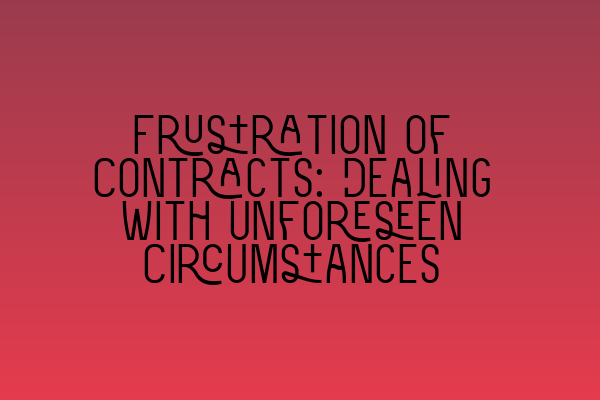Frustration of Contracts: Dealing with Unforeseen Circumstances
Contracts form the backbone of our legal system, providing a framework for individuals and businesses to enter into legally binding agreements. However, there are instances where unforeseen circumstances arise, making it impossible to fulfill the obligations laid out in a contract. In such cases, the doctrine of frustration comes into play, allowing parties to be released from their contractual obligations. In this blog post, we will explore the concept of frustration of contracts, its requirements, and how it can be dealt with.
What is Frustration of Contracts?
Frustration of contracts is a legal doctrine that refers to the unforeseen events or circumstances that render the performance of a contract impossible, illegal, or radically different from what was originally intended. It acts as a safety net when unforeseen events occur, causing parties to be released from their obligations under the contract.
Requirements for Frustration
For frustration to be legally valid, certain requirements must be met. The event or circumstance must:
1. Occur after the formation of the contract: Frustrating events must occur after the contract has been formed. Events that were known or foreseeable when the contract was entered into cannot be claimed as grounds for frustration.
2. Make performance impossible: The event or circumstance must make it physically or commercially impossible to fulfill the contract’s obligations. It cannot simply make performance more expensive or inconvenient.
3. Be beyond the control of the parties: Frustrating events must be unforeseeable and outside the control of the parties involved. If the event was caused by one of the parties, frustration cannot be claimed.
Dealing with Frustration
When a contract becomes frustrated, it is essential to handle the situation carefully to mitigate any potential dispute or legal repercussions. Here are some steps to consider:
1. Assess the situation: Determine whether the event or circumstance qualifies as a frustrating event. Consult legal experts to evaluate the impact on the contract’s performance.
2. Review the contract terms: Examine the contract terms to check for any provisions addressing frustration or unforeseen circumstances. Some contracts may include force majeure clauses that provide guidance on how to handle such situations.
3. Communicate with the other party: Openly communicate with the other party about the frustration of the contract. Discuss potential solutions and negotiate an agreement that is fair and reasonable to both parties.
4. Seek legal advice: It is advisable to seek the guidance of a solicitor experienced in contract law. They can provide accurate advice based on the specific circumstances of your contract and help navigate the legal complexities surrounding frustration.
5. Document everything: Keep detailed records of all communications, discussions, and attempts to resolve the situation. This documentation may be crucial if the dispute escalates and legal action becomes necessary.
Conclusion
Frustration of contracts offers a legal mechanism for parties to be released from their contractual obligations when unforeseen circumstances arise. It is essential to understand the requirements for frustration and handle the situation with care. Seeking legal advice and maintaining clear communication with the other party are crucial steps to navigate the complexities surrounding frustration.
To learn more about the SQE contract law and related topics, check out these articles:
1. SQE 1 Practice Exam Questions
2. SQE 1 Practice Mocks FLK1 FLK2
3. SQE 2 Preparation Courses
4. SQE 1 Preparation Courses
5. SRA SQE Exam Dates
With the valuable knowledge gained from these resources, you can enhance your understanding of contract law and its practical applications. Remember, legal expertise and informed decision-making are key when dealing with frustrating contracts.
